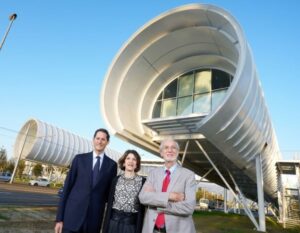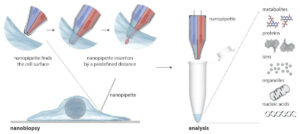Jim Grozier reviews The Importance of Being Interested: Adventures in Scientific Curiosity by Robin Ince
“The moment I put my hand in my school blazer pocket and found it full of frog entrails, I already knew science was not for me.” So writes the comedian Robin Ince in the first line of The Importance of Being Interested – which indeed is an interesting book. Ince was not attracted to science as a teenager, despite having loved it as a young child. At secondary school his interest faded, as he felt that science was “detached from the real world”. He singles out, in particular, “the mind-numbing effect of an afternoon double-physics class”, and the division between those he saw as “science boffins” and others such as himself.
So how come he had the brilliant idea of blending science and comedy, raising the profile of the discipline through an innovative radio show and road show The Infinite Monkey Cage with Brian Cox and others? His answer is disturbingly simple. “Sometime in my mid-20s,” he writes, “I bought a book about quantum physics. I didn’t really understand it, but I realized that what I wasn’t understanding was very exciting.” Ince then started to bring some science into his comedy routines – and the rest, one might say, is history.
But is developing a passion for science really that simple? Given the title of the book, Ince might argue that all that is required is interest – and if you have it, all you need is a popular-science book to get started. But what if you don’t have an interest in science? Can it be cultivated or even started from scratch – and if so, how? What were Ince’s science teachers doing wrong that resulted in his infant curiosity being smothered rather than nurtured?
The author, unfortunately, doesn’t elaborate on the circumstances of his inconsistent relationship with science; his role here is as a listener and rapporteur, so we see very little of Ince himself after the opening pages, apart from the ever-present humour. The book consists mainly of conversations he had with 100 scientists, philosophers, astronauts, religious people, pseudoscientists and sceptics during the first COVID lockdown, when all these people were “kicking their heels at home, so bored that they talked to me”.
In these chats we get a glimpse of what each of his interviewees does, and what inspires them. That is the point – this is not a science textbook, but rather a study of what it is about science (and scientists), that captivates people. I think what Ince is trying to do in this book is to pass on some of that inspiration to the reader, so that they might overcome the kind of negative responses to science that he himself experienced.
Each of the 12 chapters is based broadly around a specific scientific discipline and the people who work in it, but the themes are not well defined. Space and aliens crop up in at least three chapters, while religion features in another two, including what I feel to be the most interesting part of the book – a very thoughtfully and sensitively crafted discussion of death, starting with human mortality and then seamlessly opening out into the death of the cosmos. There are also chapters on neuroscience, evolution and time.
Throughout, Ince includes the conversations he had with some of the 100 interviewees. However, at the end he acknowledges that not all 100 made it into the book because, as he puts it, “my publishers quite rightly didn’t want a book that was as long as one of those great big biographies of Stalin that give you sciatica”. The people who do make the cut are mostly talking to Ince about their work – something that comes easily to those of us who have already caught the bug. The hope, as Cox writes in the introduction, is that Ince’s “unquenchable thirst for knowledge” will rub off on the reader.
The hope is that Ince’s unquenchable thirst for knowledge will rub off on the reader
Some of Ince’s interviewees also reveal how they came to science. Like Ince, the theoretical physicist Carlo Rovelli, a founder of loop quantum gravity theory, felt that school exercises in mechanics were “stupid” but managed to maintain his curiosity about “the nature of reality” sufficiently to build a career in physics. Aoife McLysaght was luckier. She told Ince that her path to genetics “came from an inspirational biology teacher who loved teaching and went way beyond the requirements of the curriculum”.
So, who will read this book, and what will they get from it? There are, of course, plenty of popular-science books – though probably few that use humour to communicate their message as effectively as Ince does here. But is popular-science writing just entertainment, or something more? I would like to think it exists to combat the kind of anti-science sentiments we have all witnessed during the two years of COVID, and during decades of climate change.
Understanding the science needed to tackle these threats is important; and since public money is spent on science, surely science ought to be accountable to the public in a meaningful way, which requires a greater engagement in it than now. Ince has certainly done his bit to stimulate interest, through his radio shows and live performances, and now this book. But I worry that the science discussed here is quite a small subset of the whole, and consists chiefly of what I call the “usual suspects”: quantum physics, relativity and cosmology. These subjects fascinate the casual reader because they are so weird, and so far detached from what we think of as reality. But will a fascination with such esoteric topics help people to understand – or even be interested in – the reality of climate change, or how to deal with a pandemic?
Towards the end of the book, Ince quotes Andrea Wulf, a successful science writer who describes science as like “a beautiful palace, with many, many doors”, where the doors have the names of scientific disciplines written on them. But do they really lead to something called “science”, or only to the subjects written on them – with the more useful, but less appealing, sciences shut off behind further doors down a dark corridor?
My one criticism of this eminently readable book is that it occasionally loses cohesion and reads a bit like a string of quotes. It might have been better had the author singled out just one “expert” and one topic per chapter, which might also have enabled him to cover more sciences. And he could have chosen the best evangelizer for each, making the book truly inspiring.
Overall, I’d describe this as “another popular-science book, with added jokes”. I wish it well, but with reservations about the narrow focus.
- 2021 Atlantic Books 400pp £17.99hb













